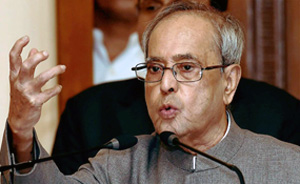New Delhi, Jan 26: Arunachal Pradesh today came under central rule with President Pranab Mukherjee giving assent to the Union Cabinet's recommendation on such a course following political instability in the state.
Official sources said the President signed the proclamation two days after the cabinet held an unscheduled meeting on Sunday to recommend that the northeasten border state be brought under central rule.
Minister of State for Home Kiran Rijiju had said the cabinet was forced to take the decision because of a Constitutional breakdown as six months had lapsed between two sessions of the state Assembly.
Yesterday Mukherjee called Home Minister Rajnath Singh and put some queries to him on the need for the imposition of President's rule even as Congress, the ruling party in the state, met him and opposed the cabinet decision.
The party urged the President not to give assent to the cabinet decision saying the issue was before the Supreme Court which has decided to hear the Congress petition tomorrow.
Other major opposition parties had also attacked the Centre's decision saying it amounted to "murder" of democracy while the BJP said the crisis was of Congress' making because it had lost numbers in the Assembly.
Arunachal Pradesh has been rocked by a political crisis since December 16 last year when 21 rebel Congress MLAs joined hands with 11 of BJP and two independents to 'impeach' Assembly Speaker Nabam Rebia at a makeshift venue, in a move branded as "illegal and unconstitutional" by the Speaker.
Meanwhile, the Supreme Court decided to hear on January 27 the Congress plea challenging the Cabinet decision.
The petition seeking urgent hearing was mentioned before Chief Justice T S Thakur, at his residence, who directed the matter to be listed for hearing on Wednesday.
The Union Cabinet's decision was based on state Governor Jyoti Prashad Rajkhowa report.
Up in arms against Tuki, 21 rebel party MLAs, including 14 disqualified a day before, with the help of BJP and independent legislators, congregated at a community hall after the state Assembly complex was 'sealed' by the local administration, and 'impeached' Rebia in an impromptu session chaired by Deputy Speaker T Norbu Thongdok.
27 MLAs in 60-member Assembly, including the Chief Minister and his ministerial colleagues, boycotted the proceedings.
A day later, in a bizarre turn of events, opposition BJP and rebel Congress MLAs congregated in a local hotel to "vote out" Chief Minister Nabam Tuki and to "elect" a rebel Congress MLA in his place but the Gauhati High Court intervened to keep in "abeyance" decisions taken at the rebel "session".
A "no confidence" motion moved by BJP MLAs and Independent MLAs was "adopted" with Deputy Speaker T Norbu Thongdok, who is also a rebel Congressman, in the Chair. A total of 33 members in the 60-member house, including 20 dissident Congress MLAs, later "elected" another dissident Congressman Kalikho Pul as the new "chief minister" of the state.
The Chief Minister had also written the President and Prime Minister Narendra Modi seeking their intervention to "uphold" the Constitution in the face of the "unprecedented murder" of democracy and "bypassing" of a democratically- elected government by the Governor.
Angry over the Governor's action in calling a session of the Assembly bypassing the government, the Congress had paralysed the Rajya Sabha for two days during the winter session.
In the High Court, Justice Hrishikesh Roy observed prima facie the Governor's decision to advance the Assembly session to December 16, 2015 for taking up the impeachment proceedings against the Speaker was in "violation of Article 174 and 175 of the Constitution.
The Supreme Court has referred a batch of petitions on the Arunachal Pradesh crisis to a Constitution Bench.
Rebia, who has challenged in Gauhati High Court various decisions of the Governor and Deputy Speaker including his removal from the Speaker's post, had alleged that the High Court's Acting Chief Justice had "erroneously rejected" his plea, filed on the judicial side, in administrative capacity. He had also sought recusal of Justice B K Sharma from hearing his plea.
Rebia was removed from the post of the Speaker by 14 rebel Congress MLAs, disqualified by the Speaker, and BJP MLAs on December 16 in an assembly session presided over by the Deputy Speaker in a Community Hall in Itanagar. The Deputy Speaker, before removing Rebia from Speaker's post, had also quashed the disqualification of the rebel Congress legislators.
Another bench of the High Court later overturned Justice Roy's order and dismissed the Speaker's petition.
Later, a statement from the Union Home Ministry said the President has signed a Proclamation under Article 356 (1) of the Constitution, imposing President's Rule in relation to the state of Arunachal Pradesh and keeping the Legislative Assembly of the state in suspended animation with effect from January 26, 2016.
"Taking cognisance of the constitutional breakdown that has taken place in the state of Arunachal Pradesh as reported by the Governor of Arunachal Pradesh, the Union Cabinet in its meeting held on January 24, 2016 had recommended to the President of India to issue such a proclamation.
"In pursuance of this proclamation, all the functions of the Government of the state of Arunachal Pradesh and all the powers vested in or exercisable by the Governor of Arunachal Pradesh under the Constitution or under any law in force in that state, which have been assumed by the President by virtue of the said Proclamation, shall, subject to the superintendence, direction and control of the President, will also be exercisable by the Governor of Arunachal Pradesh," it said.





Comments
Add new comment